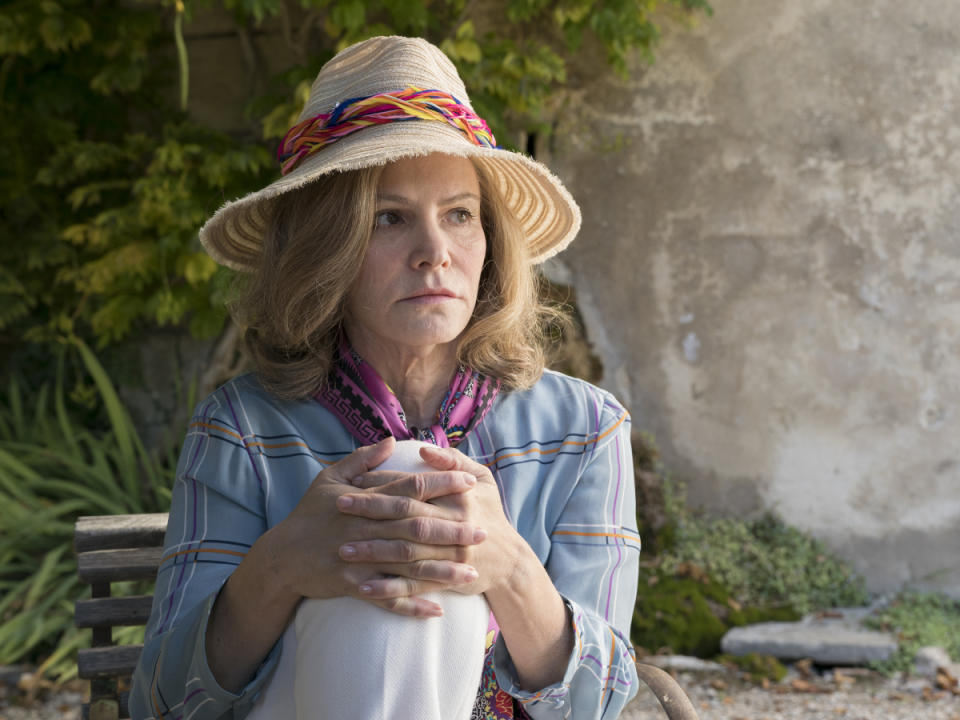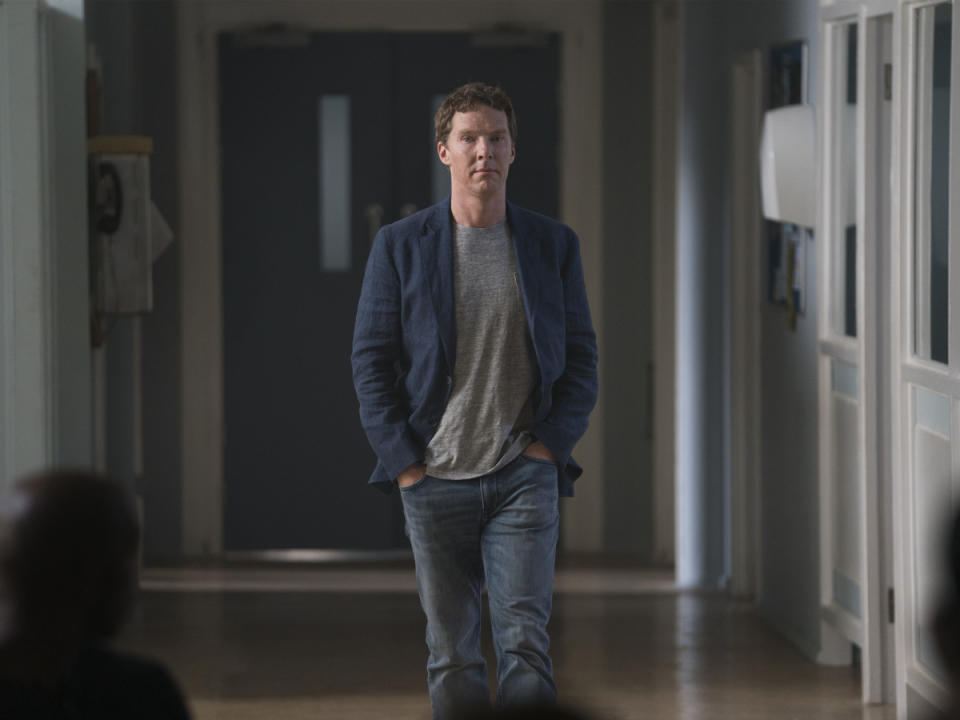‘Patrick Melrose’ Review: A Revealing Finale Closes the Book on Benedict Cumberbatch’s Poignant Limited Series

[Editor’s Note: The following review contains spoilers for “Patrick Melrose,” including Episode 5, “At Last,” the series finale.]
“Patrick Melrose” began by throwing itself headfirst into the present problem while barely skirting the cause. During the first hour, audiences watch as Benedict Cumberbatch’s lead character sends himself on a recurring loop of benders; Patrick takes drugs to counter the drugs he’s already taken, and eventually, painfully, arrives at the realization he’s an addict. He spends the entire hour thinking he can quit, but piles of increasingly dangerous evidence indicate he cannot. The series appears focused on one man’s quest to free himself from his own self-destructive tendencies, which is a tale told too many times before.
But the limited series’ final hour is its premiere’s counterpart. Audiences have come to know why Patrick turned to drugs in the first place, and in the aptly titled fifth episode, “At Last,” he finds comfort not only in reining in his bad habits but in coming to terms with what was done to him. With his father dead and buried and his mother burned to ash, Patrick is forced to confront the past one final time and ends up finding hope in the future.
It’s a satisfying, well-paced, and impeccably performed ending, even if Patrick’s ultimate inspiration is a bit familiar. “Patrick Melrose” finds its spark of originality in how he gets there; it may even spark a bit of a debate, though ultimately either answer is suitable. Readers of Edward St Aubyn’s novel may have further insights into the final flashback, but a young Patrick confronting his not-so “dear old dad” is presented here as an equivocal scene; it could be real or imagined. And yet it works either way because it’s treated as authentically as any other moment from Patrick’s past.
After asking to go to the bathroom, an adolescent Patrick reemerges to tell off his abusive father. “No,” he says when asked to come sit down on the bed. “I won’t do what you say anymore. […] It’s wrong. You’re wrong. Nobody should do that to anybody else.”

For a child to say that in that specific moment is a bit hard to believe, and the scene — as it’s been shown before — was at least implied to end differently. But it’s David’s reaction, brought to unexpected life by Hugo Weaving, that begs reconsideration: Could a grown-up Patrick imagine his dad’s reaction? David raped his wife, his son, and other children who came to visit their European getaway. Could Patrick possibly think his monster of a father would accept what he’s said and reflect inward on such horrific acts, unless he saw it happen in reality?
Read More:Summer TV Preview: The 30 Most Anticipated New and Returning Series
Perhaps Patrick only saw in flashback what he wished his younger self had said; maybe he imagined his father’s reaction because that’s just what Patrick needed to believe in order to move on as an adult. After all, as a child, he didn’t know others were being abused, and in the flashback, he said: “nobody should do that to anybody else.” With that in mind, it feels more like something Patrick wishes he could have told his father had he known what was happening to his mother.
“When we were here, when I was a child and we used to come here — and for some years afterwards, father used to… he used to rape me,” Patrick tells his mother, Eleanor (Jennifer Jason Leigh), during a flashback in the finale. The audience has been aware of this since Episode 2, “Never Mind,” but what matters isn’t that Patrick struggles to get the words out or the fact that he said them at all. It’s that his mother, Eleanor, responds bluntly, barely pausing to weigh what her son has confessed: “Me too.”
That Patrick learns this after he’s gone through so much — drugs, a failed stint at rehab, etc. — puts a thoughtful spin on what his grown self needs to overcome his past trauma. In his mother, he found a fellow victim and a cautionary tale, but he empathized too much with her and ended up mimicking her binge-drinking and toxic self-destruction. He was a man torn between loving his mother as someone who shared his burden and hating her for not protecting him from it.

“Patrick Melrose” played with these contradictions constantly, and perhaps succeeded best in presenting Patrick’s slide toward the bottom with his slide down the class system; he went from a young man inheriting family money that he was all too eager to blow on drugs and booze, to a covetous adult who didn’t want to give up the estate in which he was abused as a child, to a working man who accepted the world around him. His money was ripped away from him, and he was able to find the light.
Read More:Emmy Predictions 2018: Outstanding Supporting Actress in a Limited Series or Movie
Was that a necessity for his rehabilitation? Maybe not, but it gave the series an observant eye extending beyond just Patrick and provided commentary on a developing British class system, as well. (Pip Torrens’ Nicholas Pratt dying from his utter disgust at new-age customs was a pitch-perfect end for the character and his embodiment of old money, white privilege, etc.)
In the end, Patrick turned himself around for his children, but he was only able to do so after his parents were gone. Before, while his mother was stuck in a life she didn’t want, he struggled to see what his addictions were doing to his family even as he punished himself for them. It’s a dark view on hope to argue that your tormenters must be dead and gone before you’re able to move on from their sins, but again we return to that final flashback. Whether it’s real or imagined, Patrick is standing up for himself in that moment, just as he stands up for himself in the end.
Patrick’s struggle isn’t over. The first episode’s events are still present in his mind and the minds of viewers. That, too, may be necessary; he may need to remember in order to keep on the right path. He’s fighting — he’s trying — and that’s what matters. “Patrick Melrose” captures this quest with just enough style and just enough insight to make it resonate. Seen together, the episodes prove quite powerful and leave ample room for interpretation as well as application; not every addict will follow Patrick’s path, but everyone can identify with his journey. That didn’t seem possible at the start.
Grade: B+
“Patrick Melrose” is available to watch in full on Showtime.
Sign Up:Stay on Top of the Latest Awards News! Sign Up for our Awards Newsletter Now
Related stories
'Westworld' Review: 'Les Écorchés' Escalates the Action in a Nearly Perfect Episode
Benedict Cumberbatch 'Saves Cyclist Who Was Being Attacked' by Four Muggers

